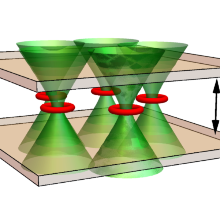Long-lived circular Rydberg atoms are picking up increasing interest for boosting coherence times in Rydberg-based quantum simulation. We elaborate a novel approach to stabilize circular Rydberg states against spontaneous and blackbody-induced decay using a suppression capacitor made from indium tin oxide (ITO) thin films, which combine reflection of microwaves with transparency in the visible spectral range.
In collaboration with the 1st Institute of Physics in Stuttgart, we have performed detailed characterization of such films using complementary spectroscopic methods at GHz and THz frequencies and identify conditions that allow for reaching circular-state lifetimes up to tens of milliseconds in a room-temperature environment. We discuss prospects of our findings in view of the quest for quantum simulations with high-n circular Rydberg states at room temperature.


